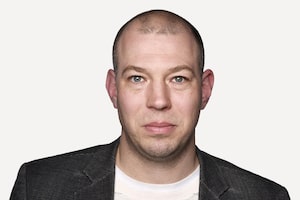Supporters of Brian Mulroney received funds from German business and political sources in their 1983 campaign to bring down then Progressive Conservative leader Joe Clark, Karlheinz Schreiber said yesterday in his fourth appearance before the House of Commons ethics committee.
The German-Canadian businessman and lobbyist was quizzed at length on his financial links with Mr. Mulroney, laying the groundwork for the former prime minister's testimony tomorrow on Parliament Hill.
Mr. Schreiber said he paid about $25,000 to fly anti-Clark delegates to the 1983 Conservative convention in Winnipeg.
He said the money came from German politician Franz Josef Strauss and the Christian Social Union, a right-wing party in the state of Bavaria.
Mr. Schreiber said he worked at the time with pro-Mulroney officials such as former Newfoundland premier Frank Moores.
"The money came from myself and from the Strauss family and probably from the Christian Social Union," Mr. Schreiber said.
Mr. Schreiber said in previous testimony to the committee that he was a fundraiser for Mr. Strauss, who was then premier of Bavaria and chairman of Airbus Industries. Mr. Strauss died in 1988.
Although Mr. Clark received the support of 66.9 per cent of delegates in Winnipeg, he resigned and called a leadership race, which Mr. Mulroney won later that year.
While Mr. Mulroney was prime minister, from 1984 to 1993, Mr. Schreiber and Mr. Moores lobbied the federal government on behalf of three major European clients, including Airbus.
A letter raised at yesterday's hearing suggested that Mr. Schreiber met Mr. Mulroney at least three months before he stepped down as prime minister to discuss a plan by Thyssen AG to set up a light-armoured-vehicle plant in Canada.
In the letter to Mr. Mulroney dated March 16, 1993, Mr. Schreiber said he discussed the so-called Bear Head project at a meeting with Mr. Mulroney and then-minister Elmer MacKay at an official federal residence.
"You were dealing with Mulroney and with his government on the question of Thyssen, right?" Liberal MP Robert Thibault asked Mr. Schreiber.
"Sure. It was my job," Mr. Schreiber replied.
Mr. Schreiber has alleged that on June 23, 1993, two days before Mr. Mulroney resigned as prime minister, the pair struck a deal under which Mr. Mulroney would promote the Thyssen project with the next government, which they hoped would be a majority Conservative government led by Kim Campbell.
Mr. Mulroney met Mr. Schreiber at a hotel in Mirabel, Que., in August of 1993, while he was still a member of Parliament, and received the first of three $100,000 cash payments.
"Oh, he was very happy and said, 'Thank you,' " Mr. Schreiber said of that exchange. "He didn't bargain with me. There was no room for any bargaining."
Opposition MPs questioned the appropriateness of Mr. Mulroney's decision to accept cash, even though Mr. Mulroney had not asked to be paid that way.
"Mr. Mulroney's main line of defence is, 'Oh darn, what a terrible mistake I made. I took $300,000 in three separate cash payments,' " NDP MP Thomas Mulcair said. "A mistake is something you do once, not something you keep repeating."
Mr. Mulroney has refused to comment before his appearance, where he plans to be accompanied by his wife and their four children.
When the federal government alleged wrongdoing against Mr. Mulroney in 1995 in relation to Air Canada's 1988 purchase of Airbus planes, Mr. Mulroney launched a defamation lawsuit and obtained a $2.1-million settlement to cover his costs.
During that lawsuit, Mr. Mulroney was asked whether he "maintain[ed]contact with Mr. Schreiber" after leaving office.
"From time to time, not very often. When he was going through Montreal, he would give me a call. We would have a cup of coffee, I think, once or twice," Mr. Mulroney answered, without revealing the cash deals.
In 1997, Mr. Mulroney distanced himself from Mr. Schreiber in an interview with author William Kaplan.
"I knew Schreiber in a peripheral way. He was associated in my mind with the Alberta Progressive Conservatives. That was the limited extent to which I knew anything about him," Mr. Mulroney said, while adding he was aware of Mr. Schreiber's connection to Bear Head.
The existence of the cash deals only came to public light in The Globe and Mail in 2003.
"Canadians still want to know why Mr. Mulroney accepted the cash, I think it's a very legitimate question," Conservative MP and parliamentary secretary Russ Hiebert told reporters.
Speaking to reporters, Mr. Schreiber said he has nothing to say to Mr. Mulroney and wants only to be refunded the $300,000 - "plus interest" - because Mr. Mulroney allegedly did not perform the agreed work on Bear Head.
Mr. Schreiber is fighting extradition to Germany, where he is wanted on charges of fraud, tax evasion and bribery.
 Greg McArthur
Greg McArthur